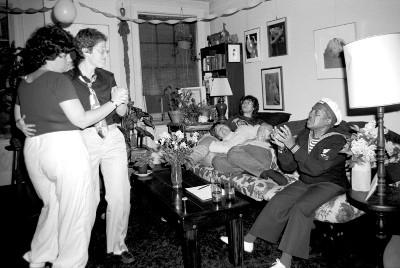
Photo courtesy of photographer Morgan Gwenwald, circa 1979.
Searching for the history of lesbian, gay, bisexual, and transgender history may seem a particularly queer conceit—and searching for meaningful places associated with efforts to document, preserve, interpret, and share that history may seem queerer still. After all, every individual has a past, so at first glance it may appear that every social group must have a shared heritage. For those who benefit from a position of power and respect, that heritage can take the form of historical knowledge elaborated over the course of centuries and conveyed via institutions of state and culture such as schools, museums, and monuments. Those marginalized by hierarchies of class, race, language, or immigrant status are often ignored in such settings, yet they have managed to convey their heritage through more informal means, with elders telling their children or grandchildren stories of earlier times that succeeding generations pass along as a vital family inheritance. Read more » [PDF 2.5 MB]
Acknowledgements: I am grateful to the many individuals who responded to my queries and requests for leads in the course of my work on this chapter; a number are cited in the footnotes. I also wish to acknowledge the following for their assistance: Alan Miller, Canadian Lesbian and Gay Archives, Toronto; Joanna Black and Alex Barrows, GLBT Historical Society, San Francisco, California; Lora Martinolich, Glendale Public Library, Glendale, California; Desiree Yael Vester, Lesbian Herstory Archives, Brooklyn, New York; Loni Shibuyama, One Archives at the USC Libraries, Los Angeles, California; the staff of the San Francisco Public Library; and the staff of the UCLA University Archives, Los Angeles, Calfornia. For reading and commenting on drafts, I thank Marcelo DeSousa, Marcia Gallo, Alexander Gray, and Gayle Rubin, and for taking photographs reproduced in the chapter, I thank Daniel Barthel, Lou Phillips and Chris Reilly.
The views and conclusions contained in the essays are those of the authors and should not be interpreted as representing the opinions or policies of the U.S. Government. Mention of trade names or commercial products does not constitute their endorsement by the U.S. Government.
Part of a series of articles titled LGBTQ America: A Theme Study of Lesbian, Gay, Bisexual, Transgender, and Queer History.
Last updated: August 11, 2017
